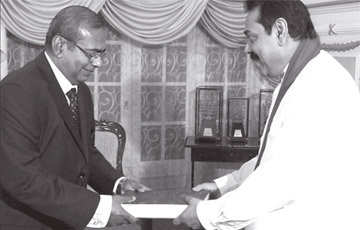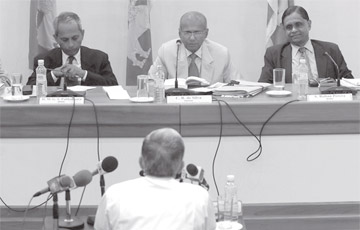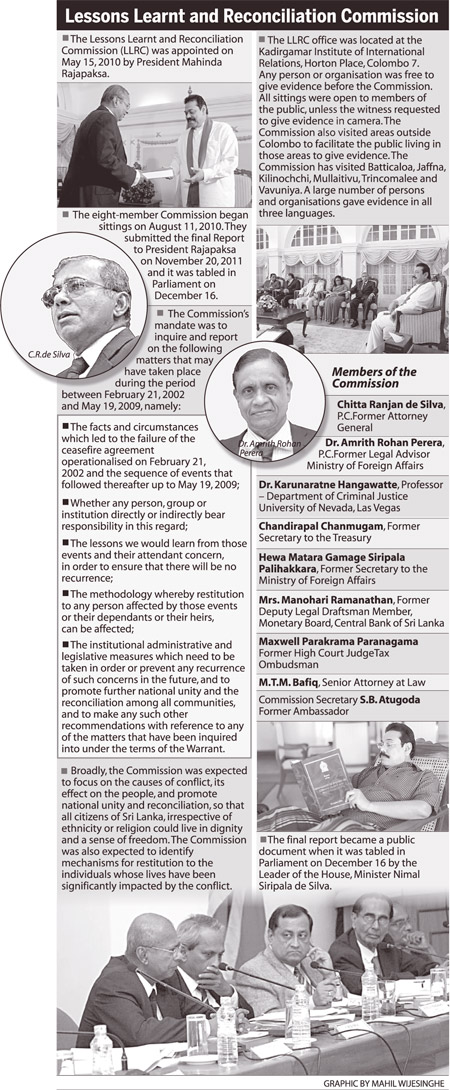Clarion call for a collective commitment to ensure peace and harmony
* No representations of deliberate targeting
of civilian concentrations by the Security Forces
*CFA was largely an unworkable and
unrealistic goal
*LTTE was totally disinterested in a
negotiated settlement
By Manjula FERNANDO
|

LLRC Report being presented to President Mahinda Rajapaksa by
the Commission’s Chairman C. R. de Silva
|
Highlighting the need for leadership for a political process to
complement what was gained by the military victory over the LTTE, the
members of the Lessons Learnt and Reconciliation Commission (LLRC) in
their final report stressed they heard no representations of deliberate
targeting of civilian concentrations by the Security Forces, a key
allegation that the LLRC was mandated to look into.
The report upheld the conduct of the Security Forces in general but
highlighted the need to inquire in to the isolated incidents where
violations were allegedly committed.
The Commission, recommended ‘a professionally designed household
survey covering all affected families in all parts of the island to
ascertain the scale and the circumstances of death and injury to
civilians and damage to property since there were references to many
deaths and injuries due to shell fire between the Forces and the LTTE’.
Citing different figures highlighted by individual UN bodies, the
Government and Hospital sources and civilians, the Commissioners
observed it is not possible to establish a verified figure of civilian
deaths given the difficult and chaotic circumstances of the situation
where all were driven by ‘saving lives than counting bodies’.
According to figures submitted by the Ministry of Defence officials,
the report estimated, 22, 247 LTTE deaths from July 2006 to May 2009.
There were 5,556 Security Forces deaths and 28,414 injured during the
same period.
In the LLRC report tabled in the Parliament by the Leader of the
House Nimal Siripala De Silva on Friday afternoon the eight members,
which included two Tamil and a Muslim member, made observations and
recommendations under the topics Ceasefire Agreement, Security Forces
Operations, Humanitarian Law issues, Human Rights, Land Issues: Return
and Resettlement, Restitution/ Compensatory Relief and Reconciliation.
 |
|
Former Sri Lankan diplomat
Bernard Goonetilleke (back to camera) gives testimony |
The Commission appointed by the President on May 2010 was mandated to
‘inquire and report on matters that had taken place during the period
between February 2002 to May 2009, mainly the breakdown of 2002
ceasefire agreement (CFA) and the sequence of events that followed
thereafter’.
The Cease Fire Agreement (CFA)
Under the CFA chapter, the Commissioners criticized the dual role
played by Norway as the facilitator and the monitor/the SLMM, adding
that this has led to the neutral role of the facilitator being
compromised.
It said this set up led to a conflict of interest, thus preventing
them from taking effective action as a monitor against the incidents of
violations. They have observed that this has contributed in a
significant way to the eventual breakdown of the CFA but added the
‘disinclination of the LTTE to terminate the conflict’ was the main
reason for its failure.
The report also criticized that Norway had handed the Government a
compromised text with the LTTE as a draft CFA, with a take it or leave
it approach, violating established principals of such a process in order
to keep the LTTE in the negotiating process.
The Commission called the 2002 CFA was ‘largely an unworkable and
unrealistic goal and it failed to provide a platform for sustainable
peace in the longer term’ apart from a short lived respite for a nation
battered by terrorism for decades. It also noted the CFA did not give
due recognition to the Muslims but categorized them with the Tamil
speaking community whom the LTTE claimed to represent which was
discriminatory to the Muslims.
Considering the actions of the LTTE immediately prior to the CFA, the
commission has concluded the LTTE was totally disinterested in a
negotiated settlement short of the creation of a separate state and they
had used the peace process to buy time.
It said the CFA led to apparent legitimization of the territorial
claims of the LTTE since the CFA categorised the country into two
distinct areas.
However on the positive side the commissioners observed the CFA that
kept the LTTE at the negotiating table for a considerable period, may
have acted as a catalyst in the disintegration of the LTTE, a process
that may have taken longer if the war persisted.
Humanitarian Law
 Under the Humanitarian Law issues the commissioners observed ‘ The
Sri Lankan experience has in fact given rise to a debate as to whether,
by unilateral declaration of a No Fire Zone, the government unwittingly
provided the LTTE an opportunity to consolidate itself amongst the
civilian enclave for strategic purposes.’ Under the Humanitarian Law issues the commissioners observed ‘ The
Sri Lankan experience has in fact given rise to a debate as to whether,
by unilateral declaration of a No Fire Zone, the government unwittingly
provided the LTTE an opportunity to consolidate itself amongst the
civilian enclave for strategic purposes.’
It says a host of such difficult issues arise when non state actors
manipulate IHL concepts such as NFZs meant to protect civilians for
military advantage. This is an area the international organizations such
as the ICRC and the UN should address and try to strengthen the legal
framework governing conflicts between the government and non state armed
groups.
There were many accounts of civilians of the LTTE firing at civilians
in order to prevent them from escaping the hostage situation created by
the LTTE as part of their combat strategy.
Learning from the Sri Lankan experience spanning from 30 years,
formulating an effective legal framework is a clear obligation that the
international community owes to all victims of conflict, it has
observed.
Disappearances
The commission says a large number of people who made representation
before the Commission, especially during its field visits to the
conflict affected areas, provided disturbing accounts of the loss of
their family members, including women, children and elderly during the
conflict most of which were ordinary civilians. They have also heard
representation on extra judicial killings, abductions, arbitrary arrests
and detentions, disappearances committed by the LTTE as well as HR
violations by the Security Forces.
It has recommended a comprehensive approach to address the issue of
missing persons as matter of urgency in addition to directing law
enforcing authorities to take immediate steps to investigate these
complaints and bring perpetrators to justice. A failure, it warns, will
present a serious obstacle to any inclusive and long term process of
reconciliation.
Given the complexity and magnitude of the problem of missing persons,
it has been recommended that a ‘special commissioner of investigation’
be appointed to investigate and report to the Attorney General for
criminal proceedings.
To ensure that lessons from these past incidents be learnt in a
manner that the mistakes will never be repeated, the Commission says
island wide human rights programmes targeting schoolchildren, youth,
members of the Security Forces and police should be initiated.
It has also been recommended that the enforced disappearances should
be criminalised in the in the domestic legislature.
Channel 4 video
Based on the allegations and the material available the commission
has recommended an independent investigation to establish the truth and
if the claims in the footage were verified, to prosecute offenders to
protect the honour and professional reputation of the soldiers.
It observed offences of a few cannot be allowed to tarnish the honour
of the many who upheld the finest traditions of service carrying out
combat duties professionally against a widely condemned terrorist group.
It has also added that if the material in the video was stage managed
as claimed by several experts, whoever constructed the video and the
broadcaster should be held responsible for instance of gross
disinformation.
PTA
The commission has observed instances of persons being detained in
custody for a long period of time under the Prevention of Terrorism Act
(PTA). In such cases it has recommended an independent advisory
committee to monitor and examine detention and arrest of persons taken
into custody under any regulations under the Public Security Ordinance
or the PTA.
Illegal armed groups
The activities of the illegal armed groups have been a serious
concern to the Commission. According to the representations made by
people during field visits to conflict affected areas, it appeared these
groups had been dominating certain areas, creating a fear psychosis
among the people.
As a solution to this the commissioners have recommended effective
action to disarm these groups and put an end to their activities.
Reiterating its interim recommendations to the President to disarm these
groups, the Commission has regretted that no conclusive action has been
taken to this effect so far.
Conscription of children
The commission observes that the LTTE has continued to conscript
children during at the tail end of the conflict and even within the No
Fire Zone. According to the representation made by a member of the
clergy by April 2009, as the conflict intensified, approximately a large
number of civilians, including those LTTE fighters who escaped, workers
from the NGO Caritas, and some doctors had taken shelter in the compound
which belonged to the St. Mary’s Church at Valayanmadam. On 23rd March
2009, a large number of LTTE cadres had surrounded this Church and
walked into its compound with their weapons despite objections raised by
the clergy. Subsequently, it was alleged that nearly 575-580 children,
between 15 to 18 years – were forcibly taken by the LTTE from this
Church compound and sent to Mullaiwaikkal. It has also drawn its
attention to the recruitments carried out earlier by the Karuna faction
in the East.
In its recommendations the commission members have highlighted the
rehabilitation of the ex - child combatants should be the utmost
priority of the Government in the immediate post-conflict phase.
The Commission says it was pleased to note the rehabilitation
programme of the Government, which has resulted in the rehabilitation,
and reintegration of hundreds of former child combatants, and in
particular the approach of the community based correctional programme
adopted by the Commissioner General of Childcare and Probation.
The Commission recommends that the same community based approach be
adopted for the rehabilitation of the former child combatants in
cooperation with NGOs and civil society organizations.
It has been revealed that 127 children, after appropriate training
and reaching the age of maturity have found overseas jobs.
Women, Children and the Elderly
According to the Ministry of Child Development and Women’s affairs,
the female headed households in the North and the East are estimated to
be 59,501, with 42,565 of them living in the Eastern Province and 16,936
in the Northern Province. There should also be a substantial number of
female headed households outside the North and the East. According to
the Ministry the data collection process is ongoing.
The commission stresses the need for the Government to make a greater
and sustained effort to enlist and engage the services of relevant
international organizations and civil society groups to assist them in
dealing with the issues of women, children and elderly.
They have also pointed out the education of children of the conflict
affected should remain a key priority of the Government.
Displaced Persons
The Commission has observed that there was a need to grant the legal
ownership of land to those who have been resettled while underlining the
need to respect the freedom of movement and the freedom to re-settle in
their places of origin.
It has also emphasized the need to facilitate the refugees in India
to return and resettle on their own volition and the need to prevent
discrimination among the two groups of the displaced persons.
Muslims
The issue of Muslim IDPs who were displaced from five districts
(Jaffna, Mannar, Kilinochchi, Mullaitivu and Vavuniya) due to LTTE
threats as far back as October 1990 remains one of the key post conflict
challenges that bears a significant impact on the process of
reconciliation, the Commission observes.
A large number of representations have been made before the
Commission on the plight of these IDPs who have been living under dire
conditions for more than two decades.
According to representations made especially during the Commission’s
visit to Puttalam, almost the entire Muslim Community of Sri Lanka’s
Northern Province numbering approximately 75,000 persons were expelled
by the LTTE in a systematic and organized manner during a two week
period in October 1990.
Northern Muslims were 5% of the population of the Province and hailed
from the five districts of Jaffna, Mannar, Kilinochchi, Mullaitivu and
Vavuniya.
A 2006 UNHCR survey estimated that there were 63,145 individuals
living in 141 separate settlements in Puttalam district alone. There are
many more outside of the Puttalam district.
The Commission has recommended appointing a special committee to
examine a durable solution and formulate a comprehensive State policy on
the issues of Muslim IDPs.
The Commission has also gone into the grievances of the Tamils,
Muslims and the Sinhalese people who lost their agricultural land due to
eviction. The Commission has also noted and commended the methodology
adopted to facilitate a safe and fair return of the displaced from Manik
Farm and other camps.
Diaspora
The Commission, recommends that the Government constitute a Multi –
Disciplinary Task Force that will include representatives from the
Presidential Secretariat, External Affairs, Defence, Foreign Employment,
the Private Sector, and Academia, to propose a programme of action to
harness the untapped potential of the expatriate community and to
respond to the concerns of the so-called ‘hostile diaspora groups,’ and
to engage them constructively with the Government and other stakeholders
involved in the reconciliation process.
If such a comprehensive approach is not adopted urgently, the
Commission feels that the current momentum towards creating a hostile
external atmosphere could grow, and those groups that advocate such a
process would continue to promote polarization that will significantly
impair the genuine efforts of others who espouse reconciliation back
home in Sri Lanka.
ISSUES OF GOVERNANCE The Commission heard submissions that some
minority grievances stem from deficiencies in the system of
administration and lack of good governance that affect all citizens
regardless of ethnicity. These deficiencies require concerted action by
allstakeholders. However specific action is needed where the system
functions particularly to the disadvantage of the minorities.The
political culture of the country has made the general public powerless
and helpless to a point that they have become dependent on politicians
to obtain many services and amenities they are entitled to.
Thus, the Commission has recommended the Government should establish
an independent institution to address the grievances of all citizens, in
particular the minorities, arising from the abuseof power of public
officials and other individuals.
Devolution of Power
Many persons who appeared before the Commission stated in clear terms
that reaching a political consensus that will facilitate devolution of
power to be of critical importance, to further the process of
reconciliation after the ending of LTTE terrorism, which was the main
obstacle against achieving such a consensus for a long time. It has
observed that it was vital that the Government should provide leadership
to a political process which must be pursued for establishing a
framework for ensuring sustainable peace and security.
The Commission has endorsed devolution of power within a broad
framework of a sovereign, multi- ethnic State to empower local
government institutions.
It has also proposed an additional mechanism, such as a second
chamber comprising representatives from the provinces to generate a
sense of confidence among the political leadership and the people in the
provinces.
National Anthem
On the question of the National Anthem, the practice of the National
Anthem being sung simultaneously in two languages to the same tune must
be maintained and supported. Any change in this practice at the present
time would only create a major irritant which would not be conducive to
fostering post conflict reconciliation.
Political consensus
One of the dominant factors obstructing reconciliation in Sri Lanka
is the lack of political consensus and a multi-party approach on
critical national issues, such as the issue of devolution. The
Commission observes that during the last four to five decades there have
been instances where ‘hate speech’ had contributed to major communal
disharmony. Since ‘hate speech’ relating to ethnicity, religion and
literature exacerbate ethnic and religious tension, creating disunity
and conflict, deterrent laws must be enacted to deal with such
practices, and these laws should be strictly enforced.
The Commission strongly recommends that a separate event be set apart
on the National Day to express solidarity and empathy with all victims
of the tragic conflict and pledge our collective commitment to ensure
that there should never be such blood-letting in the country again.
Based on testimonies it received the Commission feels that this
commemorative gesture, on such a solemn occasion, and at a high
political level, will provide the necessary impetus to the
reconciliation process the nation as a whole is now poised to undertake.
|

